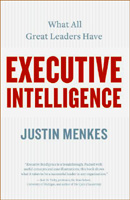
|
 |
Executive Intelligence : What All Great Leaders Have Justin Menkes 
Format: Paperback, 336pp. ISBN: 9780060781880 Publisher: Collins Pub. Date: November 28, 2006 Average Customer Review: For Bulk Orders Call: 626-441-2024 Q&A: Executive Intelligence Explained WHAT IS EXECUTIVE INTELLIGENCE? This particular kind of ability is responsible for making exceptional leaders so much better than their peers. Executive Intelligence doesn’t turn star executives into the best athletes, the best spouses, or the best chess players, but it is what causes them to be the best executives. During the course of hundreds of interviews with senior executives, including 30 of the most celebrated CEO’s in the world, Justin Menkes, co-founder of Executive Intelligence Group, found that there is an identifiable set of cognitive skills or aptitudes that all brilliant leaders have in common. Just as a person’s mathematical ability is determined by certain cognitive skills such as arithmetic, multiplication and spatial reasoning, an individual’s aptitude for executive work is also determined by certain cognitive skills. WHAT SKILLS DEFINE EXECUTIVE INTELLIGENCE? Leaders are constantly making decisions on the fly. When accomplishing tasks, they must be able to properly define a problem or differentiate high priority issues from secondary concerns. When working with people, leaders must be able to anticipate the probable effects of their actions, or recognize underlying agendas and how they might be in conflict with one another. Executives must also be able to take a critical view of their own thinking and behavior, and make appropriate adjustments. These are some of the specific skills that determine a person’s aptitude for executive work. WHAT MAKES EXECUTIVE INTELLIGENCE DIFFERENT FROM OTHER POPULAR THEORIES? Other popular theories, like “emotional intelligence”, have expanded – and diluted – the definition of intelligence to the point where its value has been lost. The most profound and indisputable discovery of management science is that cognitive ability is the strongest single predictor of managerial performance. Yet until now, nobody has sought to capitalize on this and make an intelligence test that focuses on the cognitive skills critical for executives. Instead, measures of personality and style have been introduced and relabeled as “intelligence.” Executive Intelligence refocuses our attention on those skills that are proven to directly determine business success. By doing so, a whole new level of evaluative accuracy can be achieved. CAN EXECUTIVE INTELLIGENCE BE TAUGHT? Like any set of skills, Executive Intelligence can be improved upon with focused attention and practice. However, traditional training and teaching methods are not enough. Research has shown that with specialized instruction people can significantly improve their cognitive skills, including their IQ test scores. WHY HAVEN’T THESE SKILLS BEEN IDENTIFIED UNTIL NOW? Even the most successful people, when asked what enables them to be so effective, inevitably answer in vague generalities. They themselves are not aware of the specific skills they possess, but simply apply them intuitively. If you asked Michael Jordan how he made a particularly spectacular play, he wouldn’t be able to offer a step-by-step guide. Like any other great performer, he would bring his skills to bear on a situation as it was unfolding. If we were to look at a video tape of his performance, we would see things like exceptional quickness, strength, or leaping ability. These were the core aptitudes that made Jordan so much better than his competitors. Similarly, there are core aptitudes that make great business leaders so special. And that’s what Executive Intelligence does; it lays bare the core abilities that make great leadership happen, and enables us to assess them. HOW CAN ORGANIZATIONS USE EXECUTIVE INTELLIGENCE? Executive Intelligence is more than just a new idea or theory. Until now, we’ve relied too much on trial-and-error to find great leaders- but executive intelligence yields a practical tool that can be used to identify and develop the managerial talent businesses so desperately seek. Knowing the specific skills that allow star leaders to ourperform their peers, we can concentrate on hiring people that have them. For the past three years, the largest US executive search firm Spencer Stuart has been using Executive Intelligence to help its global client select the next generation of leaders and transform their organizational performance. But instead of being made available to only the largest global corporations, this book makes these revolutionary practices available to everyone. Finally knowing the specific skills that allow star executives to so outperform their peers, we can concentrate on hiring people that have them, and even more importantly, develop these skills in ourselves. WHAT IS THE DIFFERENCE BETWEEN THE EXECUTIVE INTELLIGENCE EVALUATION AND METHODOLOGIES THAT ARE CURRENTLY USED FOR EXECUTIVE ASSESSMENT? Virtually all job interview questions assess an individual’s experience and knowledge, but noticeably absent is any measure of a person’s intelligence. That’s because the distinction between knowledge and intelligence is often blurred. Yet, this distinction is not so difficult to understand. For example, most people are familiar with the popular television show “Jeopardy,” on which contestants are rewarded for answering questions on a wide variety of topics. Often the winners are referred to as “exceptionally smart,” but the truth is that they are exceptionally knowledgeable. Successful “Jeopardy” contestants haven’t really proven anything about their intelligence. They have merely demonstrated an unusual – and impressive – facility for the recitation of facts. Only by having someone solve an unfamiliar problem can you be sure that you are measuring the candidate’s intelligence, rather than his or her capacity to repeat a solution previously witnessed, heard of, or read about. While evaluating a person’s knowledge is critically important, it provides only half of the story. Executive Intelligence is the other half – telling us how skillfully an individual will use their knowledge to perform their job. |
|

The Essential Lists BOOKS TO READ BEFORE YOU LEAD 
Grow Your Leadership Skills NEW AND UPCOMING LEADERSHIP BOOKS 
Classic Leadership Books BOOKS TO READ BEFORE YOU LEAD |
 |
| ||
 | © 2019 LeadershipNow All materials contained in https://www.LeadershipNow.com are protected by copyright and trademark laws and may not be used for any purpose whatsoever other than private, non-commercial viewing purposes. Derivative works and other unauthorized copying or use of stills, video footage, text or graphics is expressly prohibited. |
||